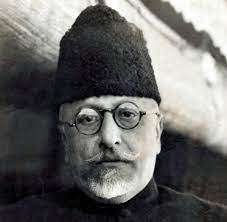Indian History
Maulana Abul Kalam Azad
- 12 Nov 2022
- 5 min read
For Prelims: Morley-Minto reforms (1909), Non-Cooperation Movement, Gandhiji’s Salt Satyagraha.
For Mains: Maulana Abul Kalam Azad and his contributions.
Why in News?
Prime Minister of India paid tributes to India's first education minister Maulana Abul Kalam Azad on his 134th birth anniversary.
- 11th November is observed as National Education Day every year since 2008 to commemorate his birth anniversary.
Who was Maulana Abdul Kalam Azad?
- Birth: Maulana Abul Kalam Azad, originally named Muhiyuddin Ahmad, was born in 1888 in Mecca, Saudi-Arabia.
- Azad was a brilliant debater, as indicated by his name - “Abul Kalam” which literally means “Lord of Dialogues”.
- Brief Profile:
- He donned many hats of being a journalist, freedom fighter, politician, and educationist.
- Contributions (Pre-Independence):
- He was a proponent of Hindu Muslim unity, opposed to Partition.
- In 1912, he started a weekly journal in Urdu called Al-Hilal which played an important role in forging Hindu-Muslim unity after the bad blood created between the two communities in the aftermath of Morley-Minto reforms (1909).
- Under the 1909 reforms, the provision of separate electorates for Muslims was resented by Hindu.
- The government regarded Al- Hilal as a propagator of secessionist views and banned it in 1914.
- Maulana Abul Kalam Azad then started another weekly called Al-Balagh with the same mission of propagating Indian nationalism and revolutionary ideas based on Hindu-Muslim unity.
- In 1916, the government banned this paper too and expelled Maulana Abul Kalam Azad from Calcutta and exiled him to Bihar from where he was released after the First World War 1920.
- In 1912, he started a weekly journal in Urdu called Al-Hilal which played an important role in forging Hindu-Muslim unity after the bad blood created between the two communities in the aftermath of Morley-Minto reforms (1909).
- Azad supported the Non-Cooperation Movement (1920-22) started by Gandhiji and entered the Indian National Congress in 1920.
- In 1923, he was elected as the president of Indian National Congress. At an age of 35, he became the youngest person to serve as the President of the Indian National Congress.
- Maulana Azad was arrested in 1930 for violation of the salt laws as part of Gandhiji’s Salt Satyagraha. He was put in Meerut jail for a year and a half.
- He again became the president of Congress in 1940 and remained in the post till 1946.
- He was a proponent of Hindu Muslim unity, opposed to Partition.
- An Educationist:
- In the field of education, Maulana Azad had been an uncompromising exponent of universalism, a truly liberal and humanitarian educational system.
- Azad’s ideal was a fusion of the Eastern and Western concepts of man, to create a fully integrated personality. Whereas the Eastern concept dwelt on spiritual excellence and individual salvation, the Western concept laid stress on worldly achievements and social progress.
- He was one of the founding members of the Jamia Millia Islamia University, originally established at Aligarh in the United Provinces in 1920.
- His Works: Basic Concept of Quran, Ghubar-eKhatir, Dars-e-Wafa, India Wins Freedom, etc.
- Contributions (Post-Independence):
- In 1947, he became the first education minister of free India and remained at this post till his death in 1958. In his tenure, he did tremendous work for the upliftment of the country.
- The first IIT, IISc, School of Planning and Architecture and the University Grants Commission were established under his tenure as the education minister.
- Indian Council for Cultural Relations, for introduction of Indian culture to other nations.
- Following three academics were formed:
- Sahitya Academy for development of literature;
- Sangeet Natak Academy for the development of Indian music and dance;
- Lalit Kala Academy for the development of painting.
- In 1947, he became the first education minister of free India and remained at this post till his death in 1958. In his tenure, he did tremendous work for the upliftment of the country.
- Maulana Abul Kalam Azad was posthumously awarded India's highest civilian honour, Bharat Ratna in 1992.
UPSC Civil Services Examination Previous Year Question (PYQ)
Prelims
Q. Which one of the following was a journal brought out by Abul Kalam Azad? (2008)
(a) Al-Hilal
(b) Comrade
(c) The Indian Sociologist
(d) Zamindar
Ans: (a)
Mains
Q. Discuss the contribution of Maulana Abul Kalam Azad to pre-and post-independent India. (2013)





